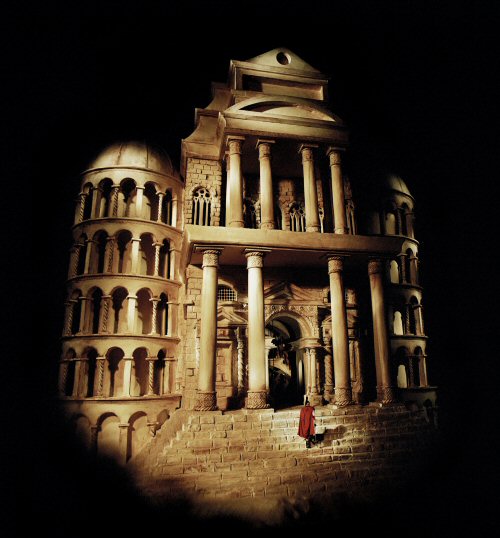 [Image: From “City of the Immortals” by Michelle Lord].
[Image: From “City of the Immortals” by Michelle Lord].
Artist Michelle Lord, whose “Future Ruins” we featured here on BLDGBLOG the other day, has another project on display this year as part of Architecture Week in the UK.
This project, the “City of the Immortals,” inspired by a Jorge Luis Borges short story called “The Immortal,” gives viewers a shadowy glimpse into Lord’s ongoing “fascination with fictional or un-built environments.”
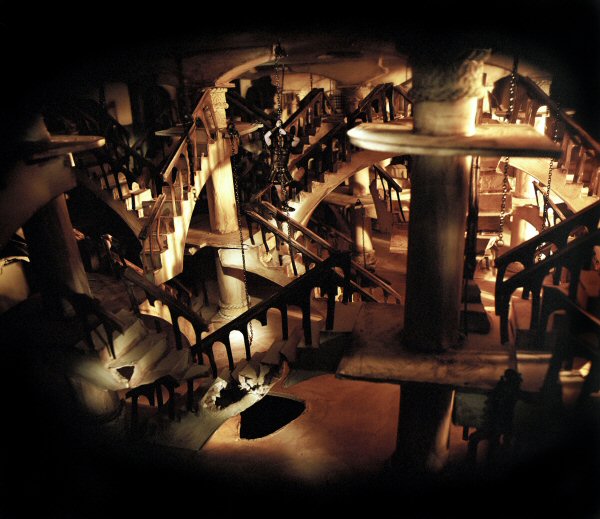 [Image: From “City of the Immortals” by Michelle Lord; also available in a slightly bigger version].
[Image: From “City of the Immortals” by Michelle Lord; also available in a slightly bigger version].
This work in particular represents “a vast fictional topography that exists within the walls of a mythological Roman city.” Within that city, according to the Borges story, “a lone figure traverses its magnificent, eternal architecture in search of immortality.”
At one point Borges describes how this narrator ascends a ladder, pulling himself up toward “a circle of sky” – through which he promptly pokes his head, making a discovery: “I began to glimpse capitals and astragals,” he tells us, “triangular pediments and vaults, confused pageants of granite and marble. Thus I was afforded this ascension from the blind region of dark interwoven labyrinths into the resplendent City.”
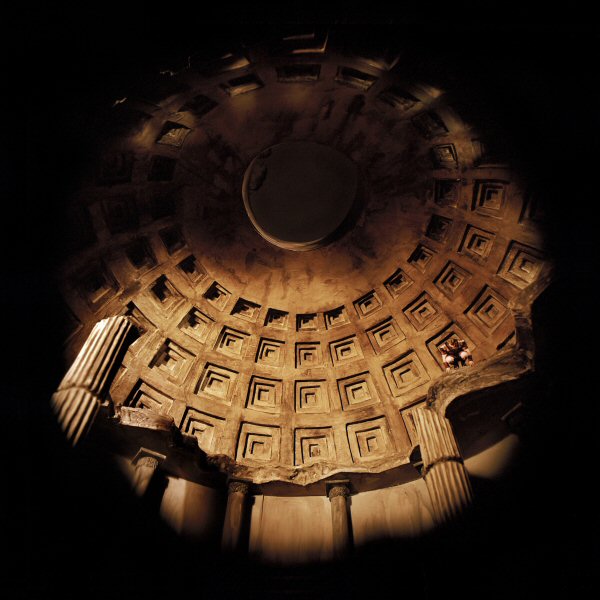 [Image: From “City of the Immortals” by Michelle Lord; see bigger].
[Image: From “City of the Immortals” by Michelle Lord; see bigger].
The story continues:
A labyrinth is a structure compounded to confuse men; its architecture, rich in symmetries, is subordinated to that end. In the palace I imperfectly explored, the architecture lacked any such finality. It abounded in dead-end corridors, high unattainable windows, portentous doors which led to a cell or pit, incredible inverted stairways whose steps and balustrades hung downwards. Other stairways, clinging airily to the side of a monumental wall, would die without leading anywhere, after making two or three turns in the lofty darkness of the cupolas.
In any case, Lord has physically constructed the architecture described by Borges; her interiors thus “intentionally evoke spatial and geometric confusion, where great pillars extend into infinity and endless staircases appear to intertwine like a three dimensional maze to form a ‘nonsense’ structure or architectural folly.”
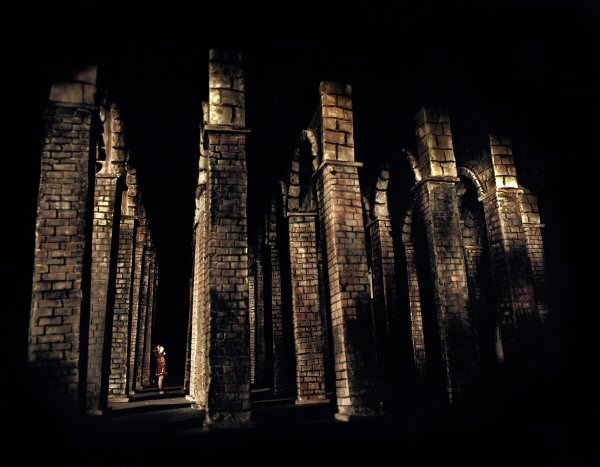 [Image: From “City of the Immortals” by Michelle Lord; also available in a moderately larger version].
[Image: From “City of the Immortals” by Michelle Lord; also available in a moderately larger version].
Citing Piranesi as an influence, she assembles a “composite of both the real and the invented.” This “demonstrates the power of paper architecture to convincingly simulate reality, where a freshly made model can evoke a lengthy history and its diminutive scale conjure up a life-size space. An intricate hybrid of photography, sculpture and architecture; the artificial eye of the camera subtly transforms these hand crafted models into a large sprawling complex, a new imaginary city.”
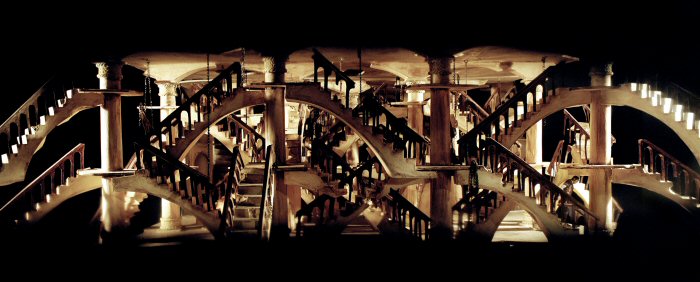 [Image: From “City of the Immortals” by Michelle Lord; also available in a slightly bigger version].
[Image: From “City of the Immortals” by Michelle Lord; also available in a slightly bigger version].
Lord’s “City of the Immortals” is on display till June 24 in Birmingham, England.
(Vaguely related: Edinburgh).
if only movies like that would be uploaded so i could get my hands on them 🙁
I’m so glad someone has made a world you can touch from one of Borges’ stories. Though the intent of the stories may be that they build worlds with words–giving the infinite and uncertain equal treatment–you can’t help imagine what the impossible would look like when you’re reading. A book made up of all possible futures. An infinite library that contains every possible combination of text and non-text.
It’s a really nice attempt to translate a literary, abstract world into images. I’m wondering if she could do something similar with Calvino’s Invisible Cities.
Salud!
Wow! Already, a comment that alludes to Calvino! ‘Invisble Cities’ is a future project I’m currently envisaging…can’t wait to explore this text in plastic dimensions, in particular Thin Cities. The previous comment drives this literary/architectural/sculptural installation inclination. More! Please…thanks, Michelle Lord
As soon as I saw the second photo, I thought of Piranesi. A friend of mine has an actual-for-real Piranesi print, one of the “Imaginary Prisons.” I could look at that thing for hours.
Having grown up in Birmingham with these structures literally on my horizon I am finding that Michelles photographs induce something of a sense of nostalgia in me. The city has become a consumers utopia with all roads leading to Selfridges and the old concrete labyrinth has taken on the status of dream memory and myth at least in my imagination. For me this work is not a criticism but a celebration of our recent history.
Above comment refers to “Future Ruins” Apologies.
I thought the book and the movie “Name of the Rose” also had an interesting transfer of a labyrinth idea. In the book it was cellular, and in the movie a series of stairs with interconnected landings – evokes the images from this post actually.
Michelle’s work is fantastic – In fact I have just bought a piece for my home. There’s more from this series and from Ultimate City on http://visualforbusiness.com
Are these photographs of real, full-size architecture, models, or computer generated graphics ??